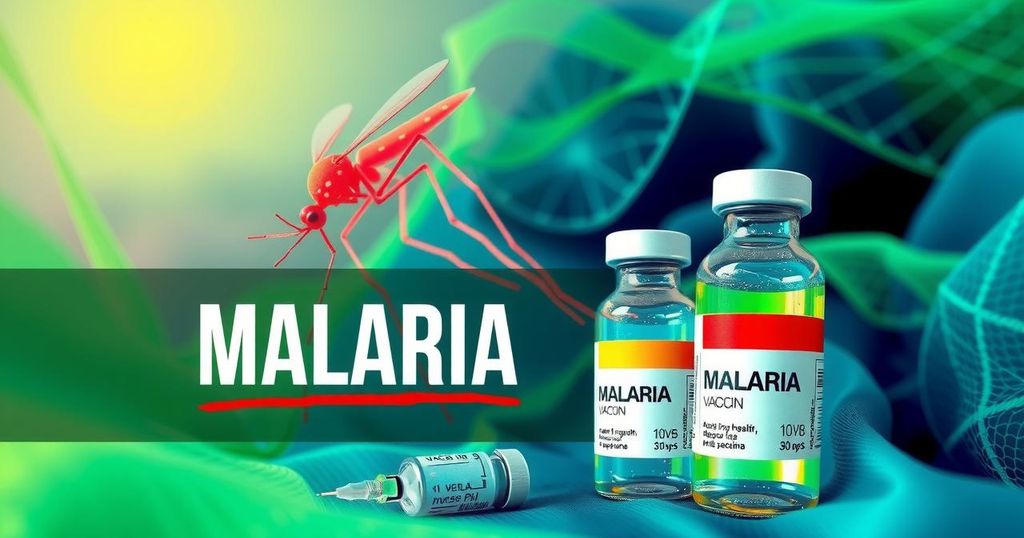Mozambique Achieves 12 Percent Reduction in Malaria Cases as Global Call Intensifies
Mozambique reported a 12 percent reduction in malaria cases in 2024, celebrated during World Malaria Day. President Daniel Chapo called for greater international collaboration and implementation of vaccination and prevention strategies. Despite challenges, including limited funding and resources, the introduction of a childhood malaria vaccine and the digitalization of health data is expected to enhance malaria management efforts.
Mozambique observed World Malaria Day recently, highlighting a notable decline in malaria cases by 12 percent in 2024. The country’s leaders, including President Daniel Chapo, voiced the urgent need for a stronger global response to tackle this pervasive health issue, a sentiment that was also echoed by the World Health Organization (WHO) according to reports from the Chinese news agency, Xinhua.
In his remarks, President Chapo called for a more extensive adoption of evidence-based interventions. These include much-needed vaccination initiatives, indoor residual spraying, the distribution of mosquito nets, and seasonal chemoprevention, which involves administering antimalarial doses to children during the peak risk period. He reaffirmed the government’s dedication to the malaria control strategies outlined in the national governance plan and emphasized the importance of collaboration with international organizations as well as public and private sector partners.
Despite advancements made in recent years, challenges remain. Insufficient funding and limited resources could potentially threaten the government’s progress in malaria eradication efforts. Malaria, transmitted through infected mosquito bites, continues to be a leading cause of illness and mortality in Mozambique, with more than 11.5 million reported cases and at least 358 hospital deaths settled last year. However, the actual number of deaths may be much higher; a recent WHO report estimates that the country has approximately 22,000 malaria-related fatalities annually.
The 2024 statistics reveal over 11.5 million cases, around 67,000 hospitalizations, and 358 in-hospital fatalities, showing a slight improvement compared to last year with the most significant reduction in cases. Moreover, hospital admissions have reduced by 4 percent and fatalities showed only a marginal decline of 1 percent. Mozambique retains a high burden of malaria, ranking fifth globally, hindered by limited healthcare resources and a climate conducive to the breeding of malaria-carrying Anopheles mosquitoes.
In a proactive move, the Mozambican government is launching various strategies to combat malaria, which includes being among only 14 African nations to implement childhood malaria vaccinations. This initiative is crucial as the WHO African Region bears a disproportionately high share of malaria cases worldwide, accounting for 94 percent of cases and 95 percent of related deaths in 2023. Notably, children under 5 years old comprise about 76 percent of all malaria fatalities, making this age group a priority for vaccine distribution.
The R21 vaccine, which scientists in Mozambique have had a role in producing, was introduced last year, with approximately 300,000 children aged 6 to 11 months in Zambézia province receiving their first of four doses. Observations indicate that nearly a third, about 32 percent, of children in Mozambique contract malaria; a single dose of the R21 can cut infections by up to 66 percent, while the full vaccination course offers extended protection.
Further aiding these efforts, the government is embracing digitalisation to enhance response efficiency. Previously handwritten records hampered data collection and analysis in the Ministry of Health’s malaria control program. In response, the Integrated Malaria Information System was created in 2022 to integrate various data systems into a more manageable format. This advancement has significantly reduced campaign durations from weeks to approximately five days, enabling swift and more effective distribution of critical resources such as mosquito nets.
Ultimately, if coupled with adequate funding, the combined power of digitalisation and vaccination strategies has the potential to greatly reduce the prevalence of malaria in Mozambique, providing hope for a healthier future for its populace.
Mozambique has made commendable progress in reducing malaria cases, with a reported 12 percent decline in 2024. A comprehensive approach involving vaccination initiatives, digital innovations, and international cooperation is critical. However, challenges such as funding and resource access must be addressed to ensure sustained momentum in the fight against malaria, a disease that continues to impact millions annually. By leveraging modern tools and strategies, Mozambique aims to forge a path toward significantly decreasing its malaria burden in the years to come.
Original Source: macaonews.org




Post Comment